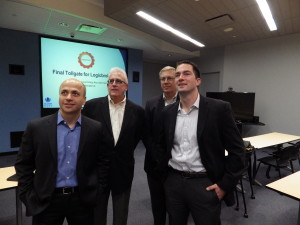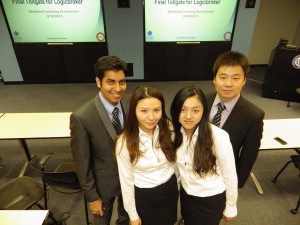The NEXT big thing
The integration and automation industry is a behemoth of software potential at $5 billion, an attention-getting number that nonetheless had limited value to LogicBroker Inc. and its CEO Peyman Zamani.
LogicBroker, with 18 employees, produces software in Shelton for automated procurement that includes broad needs like shipping, logistics, supply and resupply. Its target market is in the $5 million to $100 million annual revenue range.
If the company lacked a single resource it was in large-scale market analysis that deconstructed the $5 billion market into more usable parts.

Enter a 10-month-old state-sponsored business facilitator, CTNEXT, and a “meet and greet” it hosted earlier this year at which Zamani met Gary Breitbart, director of growth company advisory services for the Business Council of Fairfield County.
As CTNEXT”™s marketing director Kim Demers said, “Peyman Zamani met a few advisers and he could have worked with any of them. But Gary had a specific e-commerce history and Peyman said to me, ”˜Gary just got it.”™”
The next stop was UConn Stamford, where the School of Business is a leading resource ”” both human and material ”” for CTNEXT. Breitbart would not personally digest the big data required by LogicBroker, but he knew the UConn Business School could handle the task.
Zamani was recently at UConn Stamford with Jud Saviskas, executive director of the Stamford campus School of Business; Brian Brady, instructor in residence and director of the Stamford Learning Accelerator; and others to hear the final presentation by the foursome that cracked the marketing code for LogicBroker by dismantling integration and automation needs on the multibillion-dollar macro level and bringing them home.
The four are UConn Stamford School of Business graduate-level students Fei Xia, Yan Li, Amey Nirpase and Nai-Ling Hsiu. Their data are already at work, even as they completed their multimonth project Aug. 16.
“Their research has been absolutely beneficial,” said LogicBroker”™s director of sales George Heudorfer. “Market research like this lets us clearly identify market potential. We can go after customer groups and we can put the data behind it, which is important.”
Said Saviskas, “This is a great example of the School of Business putting groups of students on company-sponsored projects that have good results and that can be executed by the company.”
“We work with CTNEXT to identify growth companies,” said Brady. “Kim (Demers) saw an excellent opportunity to work with MBA student teams ”” as in this case ”” to solve problems and they are making valuable contributions toward tackling business issues.”
Those issues, said Saviskas, run the gamut “from finance to foreign exchange to seaweed nutrient extraction.”
CTNEXT has so far helped 400 companies, linking advisers and growth companies. In Hartford this month, CTNEXT sponsored a mentor match. “Almost like speed dating and a lot like a job interview,” said Demers. Of CTNEXT”™s facilitating mission, she said, “There”™s a ”˜click”™ part to what we do. Do the parties hit it off? Is there a rapport? There”™s an art and a science to what we do.
“Companies that opt to work with CTNEXT work with an adviser,” she said. “The adviser, in turn, expedites services, for example, with fundraising, with growth or with helping to solve a complex business problem like with Peyman”™s company.”
Zamani said the distilled market data from the four students had shed light on industries that included consumer electronics, furnishings and pet supplies ”” highly distribution- and procurement-themed industries of the sort LogicBroker counts among its clients.

LogicBroker”™s point man on the project was its COO Karim Hadchiti, who was absent for the meeting. It was Hadchiti, Zamani said, who was “day to day in the trenches” working with the students.
In turn, said Brady, “Karim Hadchiti gave the students experience with a senior executive, an entrepreneur and a venture capitalist, including opportunities that would not happen in a typical classroom.”
LogicBroker this month also closed Series A financing in the amount of $1.6 million through Connecticut Innovations, the state”™s quasi-public authority responsible for growing Connecticut businesses through innovative financing and strategic assistance. The financing came through the Eli Whitney Fund as part of the Series A funding round that included existing and new investors. The money will be used to further fast-track the company”™s already impressive growth. Connecticut Innovations reports it has helped bring $4 billion in financing to companies in the state, creating more than 26,000 jobs.
UPDATED (8/26/13): An earlier version of this article misspelled the name of Peyman Zamani in the text and George Heudorfer in a photo caption.